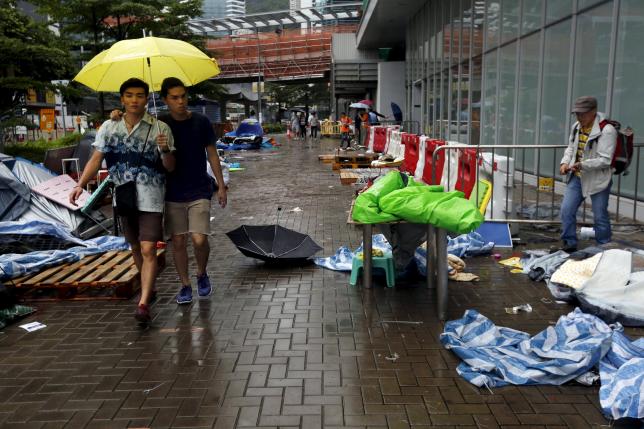Hong Kong expects large pro-democracy rally as it marks 1997 handover

HONG KONG - Some seven months after Hong Kong police forcibly cleared pro-democracy street protesters from the streets, tens of thousands of people are expected to rally for free elections on Wednesday as the city marks the 18th anniversary of its return to China.
A morning flag-raising ceremony will be attended by China's most senior official in Hong Kong, Zhang Xiaoming, who said this week the city should shift its focus from political reform and concentrate instead on economic development.
Thousands of police will be on standby for the annual march marking the 1997 handover from Britain to China, media said, as tensions remain high following clashes over the weekend between pro-democracy activists and supporters of the central government in Beijing.
"I think Hong Kong people's determination to fight (for democracy) has not changed. We believe they will treasure this opportunity to express themselves and take part in the march," said Daisy Chan, convener of the Civil Human Rights Front, which organizes the rally.
It comes nearly two weeks after Hong Kong's legislature vetoed a Beijing-backed electoral reform proposal that had triggered sometimes violent protests in the city, presenting Beijing with its most serious challenge in years.
Police cleared away the last few pro-democracy tents near government headquarters last week.
Around half a million pro-democracy protesters joined the July 1 march last year, when police arrested more than 500 people who blocked a road in the financial district, in what was seen as a prelude to the massive 79-day Occupy movement of civil disobedience that kicked off in September.
The July 1 demonstration has been a fixture of the protest calendar. In 2003, half a million people demonstrated against proposed anti-subversion laws that were later scrapped.
Tung Chee-hwa, the city's leader at the time, stepped down in March 2005, nearly two years before completing his second five-year term.
Hong Kong returned to China under a "one country, two systems" formula that granted the city wide-ranging freedoms denied in mainland China, including the right to large public protests that include a June 4 vigil to mark the 1989 crackdown on pro-democracy protesters in Beijing.
China also held out the promise of universal suffrage. The electoral blueprint rejected by lawmakers would have allowed a direct vote for the city's next chief executive in 2017, but only from among pre-screened, pro-Beijing candidates. - REUTERS







